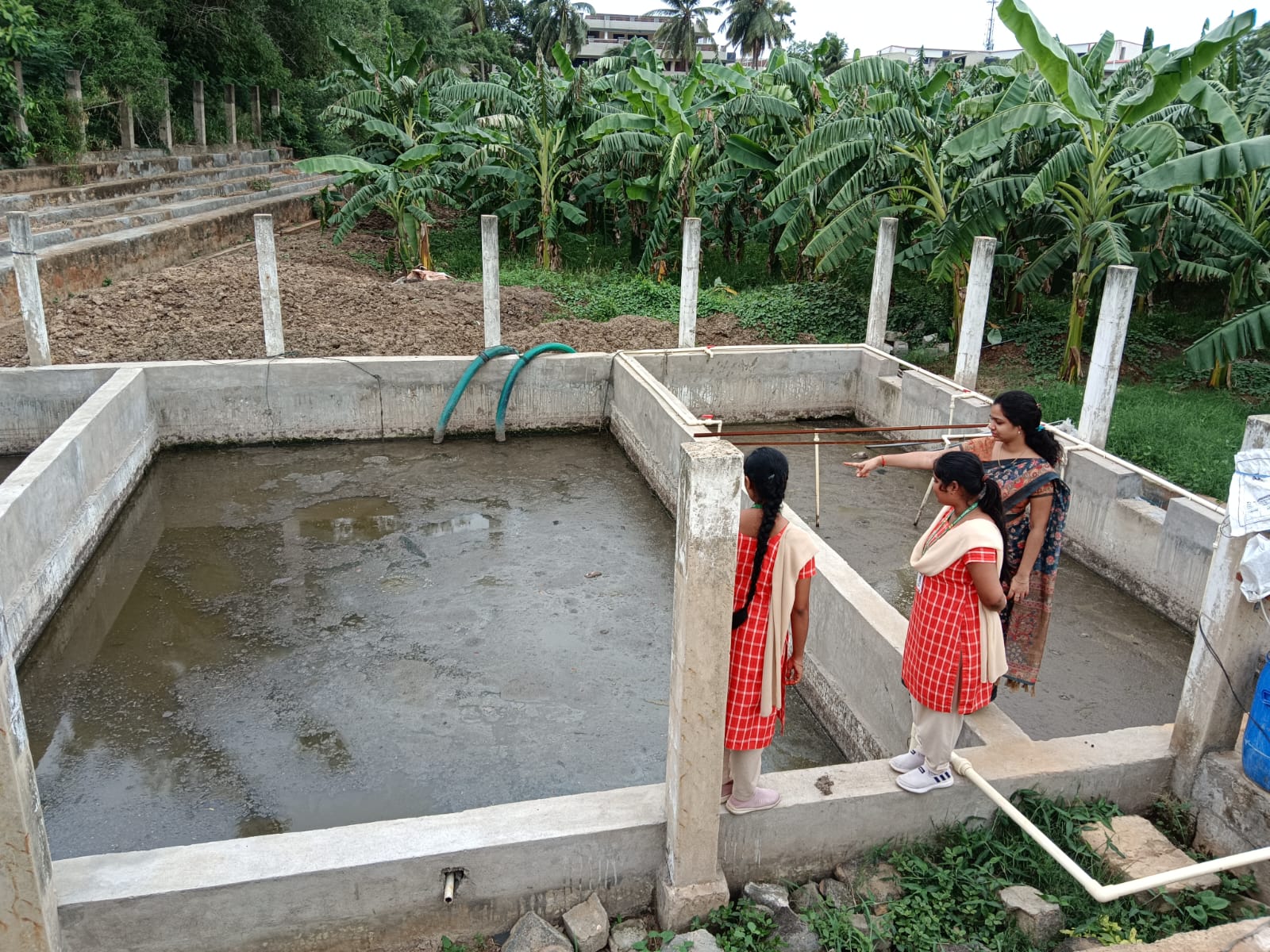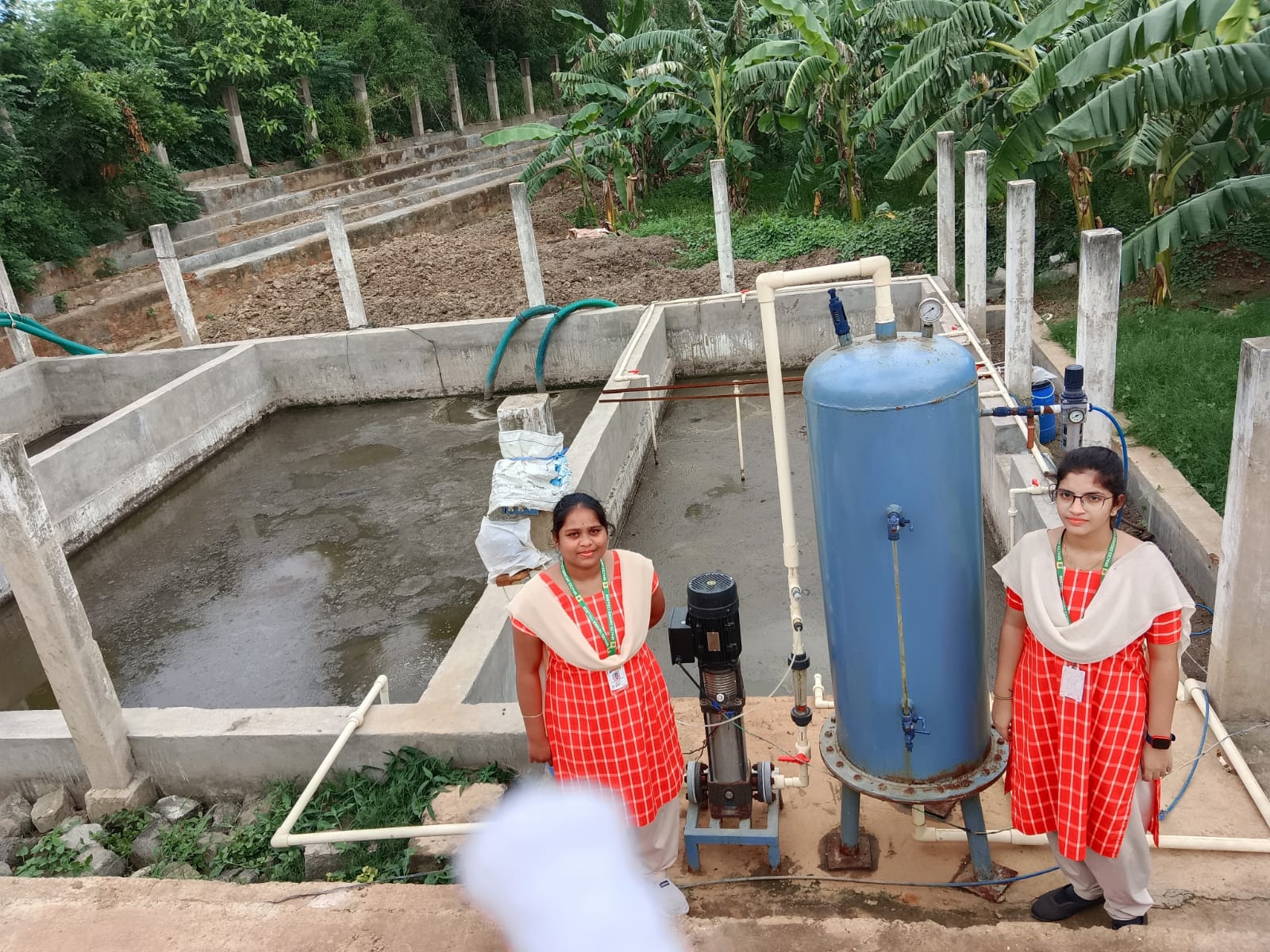BEST PRACTICE-1
“OPERATION OF A 1,50,000 LITERS/DAY SEWAGE TREATMENT PLANT”
OBJECTIVES:
To decontaminate and remove the pollutants, unwanted substances from the liquid waste generated from kitchen (mess), domestic source (Cattle shed) and the bathrooms effectively.
To recycle the decontaminated and treated water for irrigation purposes.
CONTEXT:
The liquid waste generated from the kitchen (mess), domestic source, bathrooms if untreated, create challenges for environmental sustainability by affecting the aqua life in the water bodies. To promote environment sustainability for future generation and appropriate disposal of waste water is necessary.
PRACTICE:
The STP located near the cattle shed has a capacity of 1,50,000 lit/day, and works on the principle of “flocculation”. The sedimented solids from the waste water are removed by adding a flocculating agent alum, through Dissolved air Flotation (DAF) method.
High pressure air (nearly 4 atm pressure) is pumped into the primary chamber. As a result of this “Scum” is formed, the formed scum is collected and used as manure for plants.
The water from the primary chamber is sent to the secondary chamber where it is subjected to Aeration, which involves the removal of Biodegradable organic matter (BOD) and suspended solids.
EVIDENCE OF SUCCESS:
The treated water from the STP is free from solid wastes and is colorless and odorless and has been certified by the laboratory for safe usage for irrigation.
The treated water is recycled to irrigate banana plantations, lawns and gardens and also for maintaining a green campus throughout the year.
PROBLEMS ENCOUNTERED:
Time to time vigilance is required
Needs regular maintenance
Regular testing of water samples (BOD, COD) for irrigation is a tedious process.


Best Practice 2:
STUDENT INTERNSHIPS IN VERMI-COMPOST, MUSHROOM CULTIVATION, SOLAR FENCING, AND CANTEEN MANAGEMENT
OBJECTIVE:
To provide students with hands-on learning opportunities in sustainable practices, entrepreneurship, and skill development by engaging them in practical internships in areas such as vermi-compost production, mushroom cultivation, solar fencing, and canteen management.
CONTEXT:
With the increasing emphasis on experiential learning, it has become essential to expose students to real-world applications of sustainable technologies and entrepreneurial practices. These internships aim to enhance the students' practical skills, foster a sense of responsibility towards the environment, and equip them with knowledge that aligns with both local and global needs. Each domain provides a unique opportunity for students to learn, innovate, and contribute to their community.
Vermi Compost
Students participate in the preparation and maintenance of vermi-compost units.
They learn the process of decomposing organic waste using earthworms (“Eisenia fetida” ) to produce nutrient-rich compost.
Hands-on activities include sorting organic waste, monitoring moisture levels, and harvesting compost.
Mushroom Cultivation
Students are trained in cultivating Oyster mushrooms, including selecting spores, preparing substrates, and maintaining the ideal growth environment.
They explore the nutritional and economic benefits of mushrooms and study sustainable agricultural practices.
Canteen Management
Students engage in the day-to-day operations of managing a canteen, including inventory management, food preparation, hygiene maintenance, and customer service.
They develop skills in teamwork, budgeting, and small business management.
Solar Fencing
Interns gain exposure to renewable energy technology by working on solar fencing installations.
They are involved in assembling, installing, and maintaining solar fencing systems to protect agricultural fields from animals while utilizing sustainable energy sources.
Evidence of Success:
Skill Development: Students acquire practical skills in sustainable technologies, agricultural practices, and entrepreneurship.
Employment Readiness: These internships prepare students for careers in agriculture, renewable energy, and business management.
Community Awareness: By working on these projects, students spread awareness about sustainable practices within their communities.
Financial Independence: Students are compensated ₹40/hour for their contributions, encouraging active participation and financial independence
Some students use their learnings to start small ventures, creating a source of income.
Problems encountered:
Initial Lack of Awareness: Some students were initially unaware of the benefits of these internships. Orientation programs and workshops were conducted to highlight the opportunities.
Resource Constraints: Limited infrastructure was managed through partnerships with local organizations and resource optimization.